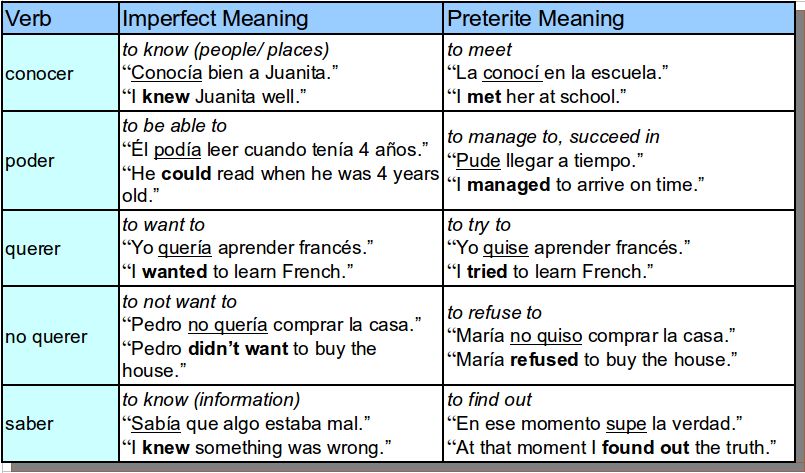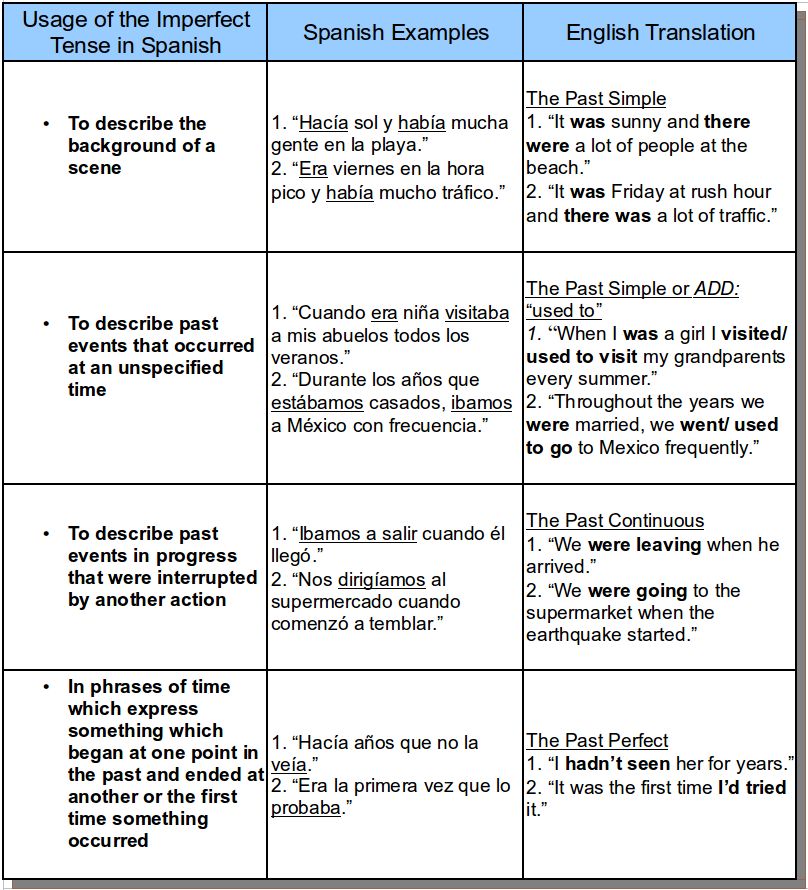You are here
5.1 Translating the Past Tenses from Spanish to English
Considering Spanish has two past tenses (the preterite hablé, comí and the imperfect hablaba, comía) for English’s one past tense (I talked, I ate), it can be much more complicated to translate from English to Spanish using the past tenses than from Spanish to English. In this section, we will explore how some verbs in Spanish have a special meaning when used in the preterite tense and how the Spanish imperfect tense is not always translated into the past simple in English. These points will be important to keep in mind when translating from Spanish to English.
a) Translating the Spanish Preterite Tense to English
The preterite tense is used to describe actions that have been completed in the past. It can be used to refer to one action or a series of actions, but there is always emphasis on the action being completed. The preterite tense is normally translated to the past simple form in English.
As a reminder, the Spanish preterite tense has two verb patterns for regular verb conjugations:
AR verbs (for example: llamar)
yo llamé nosotros llamamos
tú llamaste
él/ella/usted llamó ellos/ellas/ustedes llamaron
ER/ IR verbs (for example: vivir)
yo viví nosotros vivimos
tú viviste
él/ella/usted vivió ellos/ellas/ustedes vivieron
There is also a set of irregular verbs, all of which use the same endings no matter whether they are AR, ER, or IR verbs.
Irregular verbs (for example: poder)
yo pude nosotros pudimos
tú pudiste
él/ella/usted pudo ellos/ellas/ustedes pudieron
The preterite is often used when there is a time phrase indicating when an action happened or how long it lasted.
Here are a few examples of sentences using the preterite in Spanish:
| Spanish | English |
| “El año pasado fuimos a California.” | “We went to California last year.” |
| “Ustedes nos llamaron el lunes.” | “You called us on Monday.” |
| “Trabajé allí durante seis años.” | “I worked there for six years.” |
Verbs with Special Meaning in the Preterite
Since the preterite tense is used to describe completed actions, some verbs which normally don’t describe an action change their meaning when used in the preterite. These changes in meaning can be seen in the following figure:
Figure 5.1

b) Translating the Spanish Imperfect Tense to English
The imperfect tense has two possible patterns in Spanish and is very regular.
AR verbs (for example: llamar)
yo llamaba nosotros llamábamos
tú llamabas
él/ella/usted llamaba ellos/ellas/ustedes llamaban
ER/ IR verbs (for example: vivir)
yo vivía nosotros vivíamos
tú vivías
él/ella/usted vivía ellos/ellas/ustedes vivían
The only irregular verbs in the imperfect tense are "ser" (era) and "ir" (iba), as well as "ver" (veía) which is considered irregular for maintaining the “e”.
The imperfect tense has many more uses in Spanish than the preterite. It is to describe:
Figure 5.2

c) Explanation of uses of the imperfect tense in Spanish
Since the imperfect tense in Spanish should not always be translated to the past simple tense in English, it can be important to examine the different uses of the imperfect and how each would be translated to English. Following are some more examples which reflect the usages shown in Figure 5.2.
1. To describe the background of a scene
As this use is employed more for narrative purposes, it might not be used often in DCS correspondence.
Example 5.1
Source Text
Translation
2. To describe past events that occurred at an unspecified time
To describe an event that occurred at an unspecified time in the past, English uses the past simple tense and often modifies this with “used to”. When “used to” is employed, all verbs it applies to are written in the present tense.
Example 5.2
Source Text
Translation
OR
3. To describe past events in progress that were interrupted by another action
When the imperfect is used to describe an event in progress in the past that was interrupted by another action (which would be expressed in the preterite), the imperfect must be translated to the past continuous form in English (was talking) while the preterite is translated to the past simple (talked).
Example 5.3
Source Text
Translation
Source Text
Translation
As you can observe in these examples, a past event in progress may be described in Spanish by either the imperfect tense or the past progressive tense (which is formed with the imperfect form of estar and the past participle - estaba esperando). In either case, the verb would be translated into the past continuous form in English.
4. In phrases of time which express something which began at one point in the past and ended at another, or the first time something occurred
This usage often occurs in ‘time expressions with hacer’. Just as in the present tense these phrases require the present perfect in English, in the past, they are translated to the past perfect (had talked) in English.
Example 5.4
Source Text
Translation
Source Text
Translation
